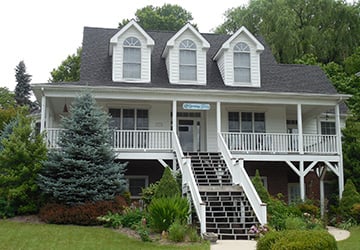Whether you are buying or selling a home, getting an inspection is an essential part of the process. For the seller, an inspection can help determine your asking price and make you aware of potential problems with the home. The home buyer gets the chance to learn everything about the home they are purchasing: the good, the bad and the ugly. Both parties can enter into the sales process feeling more comfortable if they do so with open eyes.
Typically, an inspection takes place once a potential buyer makes an offer on the home. This helps reduce the chances of multiple inspections from less-than-serious buyers. During the inspection, the potential buyers can come along with the inspector and view everything the inspector is seeing. The buyer gets to know exactly what they are buying.
What Does the Inspection Cover
Visual Home Inspection
During the inspection, the inspector will look at your foundation, roof, plumbing, heating system, electrical system, air-conditioning (or swamp cooler), insulation, fireplaces and ventilation. In addition, some buyers may request an inspection for pests (particularly termites) and gas leaks, as well as radon testing and well water testing.
The Home Inspection you will receive is a non-invasive, visual examination of the readily accessible items identified in the inspection report. The inspector is not an expert in every building craft or profession. Therefore, the home inspection is not technically exhaustive. The inspection is designed only to identify unsafe/non-functioning systems, structures and/or components that were exposed to view and apparent as of the time/day of the inspection. A written inspection report will describe and identify the inspected systems, structures, or components of the building inspected, and shall list any unsafe or non functioning systems, structures, and components observed during the inspection.
The inspection report is a written opinion of a trained home inspector based upon what was visible and evident at the time of the inspection. The report is not a listing of repairs to be made and is not intended for use as a guide in re-negotiating a real estate transaction. Items that are not listed in the inspection report were not inspected and are not included under the scope of the inspection service provided. It is agreed that the inspector is not, as part of the inspection, determining compliance with installation guidelines, construction documents, manufactures specifications, building codes, local ordinances, zoning regulations, covenants, or other restrictions, including local interpretations thereof.
Inspection Standards
The home inspection and/or systems inspected will be performed in accordance with the scope and standards of practice of the American Society of Home Inspectors (ASHI) and in accordance with any specific State or Provincial standards and/or licensing requirement. A copy of the standards of practice is generally available through your inspector.
General Exclusions
The inspector cannot examine what cannot be seen by a non-invasive, visual examination. No removal of materials or dismantling of systems shall be performed during this inspection. The inspector is not required to, nor will he/she move furniture, floor coverings, insulation, stored materials, personal belongings, open walls or perform any type of destructive or invasive testing in order to perform the inspection. This inspection company is not responsible for any condition that may be covered, concealed or inaccessible because of, but not limited to, soil or vegetation, walls, structural members, furniture, floor coverings, insulation, stored items, personal belongings, water, ice, snow, soot or conditions that would be considered a danger to the inspector. The home inspection is not a compliance inspection or certification of compliance with past or present governmental codes or regulations of any kind.
Whether or not they are concealed or inaccessible, the following items and systems are not usually within the scope of most inspection services provided:
- Engineering Analysis of any kind including structural integrity, system design problems, acoustical characteristics, functional adequacy, operational capacity or costs, quality or suitability for a particular use
- Geological stability or ground condition of site
- Soils or Soil Contamination
- Scientific or specialized technician tests, readings or evaluations (unless agreed upon previously)
- Issues directly or indirectly related to Drywall from the People's Republic of China
- Fireplace draft
- Cosmetic items, including paint, scratches, scrapes, dents, cracks, stains or faded surfaces, flooring, insulation unless required by law,
wall coverings, carpeting, paneling, lawn and landscaping - Condominium or co-op common areas or areas under the management of the condominium or co-op association
- Home warranty, system warranty and/or component warranty
- Telephone and TV cables
- Cisterns
- Fountains
- Low voltage lighting and electrical systems
- Electrostatic precipitators
- Electronic air cleaners or filters
- Active or passive solar system
- Pressure tests on central air conditioning systems
- Furnace heat exchangers
- Radiant heating systems
- Free standing appliances and other personal property
- Water volume or flow
- Water conditioning/softening systems
- Security system
- Central vacuum system
- Landscaping
- Irrigation systems
- Conditions relating to animals, rodents or other household pests or the damage caused thereby
- Septic System
- Wells or Well Pump
- Water Quality
- Swimming pools, Saunas, Hot tubs, Spas/Whirlpools or attached equipment
- Mold/Mildew/Fungus or spores thereof or conditions related to Mold, Mildew or Fungus
- Detached Buildings or Equipment
- Environmental hazards including, but not limited to; Asbestos,Radon, Lead, Formaldehyde, Electro Magnetic Fields (EMF's), Microwaves
- Wood Destroying Organisms including, but not limited to, Termites, Carpenter Ants, Wood Boring Beetles and Fungal Rot
Following the inspection
After the professional inspector thoroughly looks at the house, he or she will write up a report about the house. The report will include all damage, potential costs for repairs and signs that there may be expensive repair costs in the future (leaky roof, foundation problems, old furnace etc.) The buyer can then decide if they are still interested in purchasing the home or want to adjust their offer based on the information they receive about the home.
Inspection Tips for Buyers
If at all possible, you should attend the inspection. You will get a first-hand look at potential problems and have the option of asking questions about things that may concern you. Remember to ask the inspector any questions you have about costs, repairs and dangers of any damage you see. This is the time to make sure you understand everything about your purchase before you sign the dotted line.
Listen to the inspector. When you purchase a home, you would be wise to follow-up on any recommendations by the inspector. Trust their professional opinion and address any immediate problems as quickly as possible to lower your risk of more expensive repairs in the future. Your inspector can spot most problems, but they are human and cannot predict all possible outcomes.
Inspection Tips for Sellers
Having your home inspected can feel incredibly invasive. To avoid the awkwardness and to allow the inspector to do his or her job thoroughly, leave the house for the inspection. This removes the temptation to try to defend your home.
Before you list your home, look around your home and do your own inspection. This will reduce the risk of surprises when inspection time comes. Additionally, knowing the condition of your home prior to the sale can save you time and money. You may choose to invest a little money or hard work to make some repairs yourself to increase the sell-ability of your home.
Choose a good inspector with good credentials. When you choose an inspector for the home make sure you choose someone who has the skills and experience to offer a fair evaluation. Get recommendations from your real estate agent, friends and family and do a little research. Look for an inspector that is a member of the American Society of Home Inspectors (ASHI).
A good inspector protects both the buyer and the seller from future problems.














